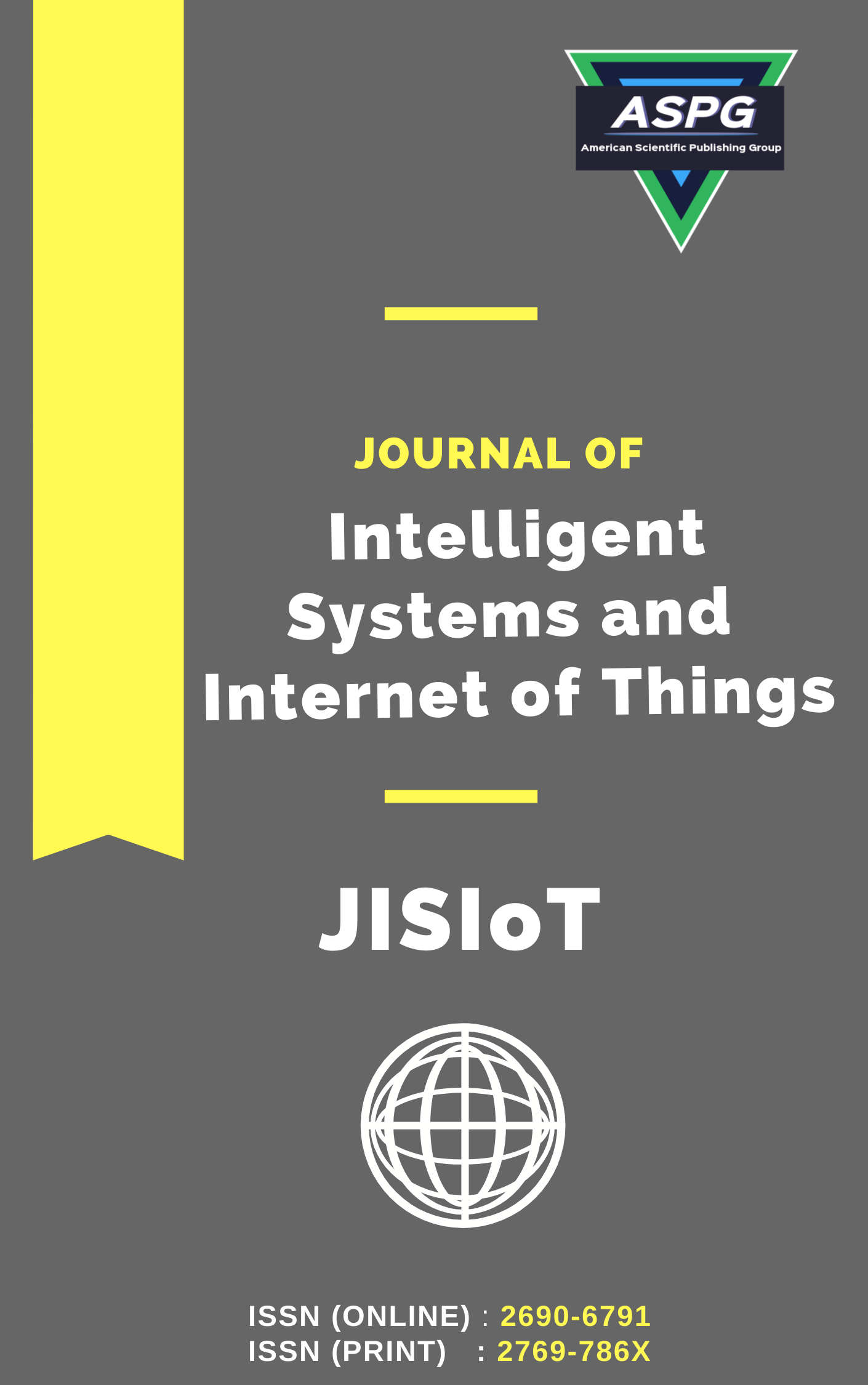

Volume 7 , Issue 2 , PP: 60-70, 2022 | Cite this article as | XML | Html | PDF | Full Length Article
R.A.E. Ibrahim 1 * , A. E. E. El Alfi 2 , A. AdbElbadie Abdallah 3
Doi: https://doi.org/10.54216/JISIoT.070206
This study presents a novel framework to help people with color impairment in identifying colors. The proposed framework consists of three stages. These stages are electronically performing the Ishihara test, performing the color blindness type recognition test, and guiding the person to color by voice. The first stage, the person is subjected to an electronic color blindness test, by displaying different plates containing several points of different sizes and colors. The person is required to correctly identify the number or shape in the plate and at the end, the system determines the extent to which a person is color blind. The second stage is a color recognition test to determine the type of color blindness. If there is difficulty in determining red, this is called protanopia. But the difficulty in identifying the green color is called deuteranopia. While the inability to recognize the blue color is called tritanopia. And finally, the difficulty in identifying the colored style is called achromatopsia. The third stage is assistance phase and is divided into three subsectors are: smart educational system, identifying colors and extracting the content. The proposed system differs from other systems in that it is an integrated system. It includes identifying color blindness, determining its type, and finally aiding color blindness person. Also, it is the first system that deals with the rare type of color blindness called achromatopsia in addition to its other three types. The results obtained confirmed that the proposed system as well as the smart educational system are characterized by high accuracy and effectiveness.
Intelligent Learning System , Color Impairment , Image Processing
[1] Nicolás González Bardeci and María Gabriela Lagorio, "A mathematical approach to assess the ability of light filters to improve color discriminability of color vision deficient persons ", Heliyon, Vol.7, No. 9, September 2021, PP.2-4.
[2] Ivan Reinaldo, Nadia Sarah Pulungan and Herru Darmadi, "Prototyping "Color in Life" edugame for Dichromatic Color Blind Awareness ", Procedia Computer Science, Vol. 179, No. 27, 2021, PP.773-780.
[3] Katherine E.M. Tregillus et al., "Color Compensation in Anomalous Trichromats Assessed with fMRI", Current biology, Vol. 31, No. 5, March 2021, PP.936-942.
[4] Fong-Gong Wu , Chao-Yuan Tseng and Chun-Min Cheng, "The composition of visual texture design on surface for color vision deficiency (CVD)", Computers in Human Behavior, Vol. 91, February 2019, PP. 84-86.
[5] Meenakshi S and Anshu Singla, "A Fuzzy Based Method to Simulate and Color Correct Images for Varying Degrees of Color Blindness", Electrochemical Society Transactions, Vol. 107, No. 1, 2022, PP.10832-10840
[6] Sheikh Mohd Saleem, "deutranomalia: the commonest type of red-green color vision deficiency in kashmiris", international journal of scientific research, Vol.6, No.9, September 2017, PP.52 -54.
[7] Amir Rosenblatt, Eyal Cohen and Chaim Stolovitch, "Comparison of Ishihara Booklet with Color Vision Smartphone Applications", Optometry and Vision Science, Vol. 93, No. 7, July 2016, PP.668-670.
[8] KeunYoung Ahn and YounJin Lee, "The Colors of Digital Textbook UI Design Elements for Smart Learning", AIC CONGRESS, Vol.26, No.1, 2022, PP.234-237.
[9] Rong Ye and Ce Li, " Colorblind Image Correction Based on Segmentation and Similarity Judgement", Journal of Physics: Conference Series (1089- 5678), Vol. 1098, No.187, 2022, PP.20-28.
[10] Kashif Naseer Qureshi et al.," Internet of Things for education: A smart and secur e system for schools monitoring and alerting", Computers & Electrical Engineering , Vol. 93, 2021, PP.107-109.
[11] Satrughan Kumar Singh and Jainath Yadav, "Machine learning & image processing for handwritten digits and alphabets recognition from document image through MATLAB simulation", IOP Conference Series: Materials Science and Engineering, Vol.1084, No.1, March 2021, PP.13 -15.
[12] Yinan Miao, Jun Young Jeon and Gyuhae Park, "An image processing-based crack detection technique for pressed panel products", Journal of Manufacturing Systems, Vol.57, No.29, 2020, PP.287-290.
[13] R.Udendhran, et al., "Enhancing image processing architecture using deep learning for embedded vision systems", Microprocessors and Microsystems, Vol. 76, July 2020, PP.10-12.
[14] Thoopsamut P and Limthanmaphon B, "Handwritten signature authentication using color coherence vector and signing behavior", 2nd international conference on information science and systems, 2019, PP.38-42.
[15] Moslehi M and de Barros FP, "Using color coherence vectors to evaluate the performance of hydrologic data assimilation", Water Resour Res, Vol.55, No.2, 2019, PP.1717-1729. https://doi.org/10.1029/2018WR023533
[16] Reshma Chaudhari and A. M. Patil, "Content Based Image Retrieval Using Color and Shape Features", Electronics and Instrumentation Engineering, Vol.1, No.5, 2012, PP.387-388.
[17] Greg Pass, Ramin Zabih and Justin Miller, "Comparing Images Using Color Coherence Vectors", Proceedings of the fourth ACM international conference on Multimedia, Vol.96, 1996, PP.66-67.a. Available at: https://owlcation.com/ stem/ Image-Retrieval-Color-Coherence-Vector, Date of Access: 15 /3/2022, At:07:30am.
[18] Saluka Ranasinghe Kodituwakku and S.Selvarajah, "Comparison of Color Features for Image Retrieval", Indian Journal of Computer Science and Engineering, Vol.1, No.3, April 2014, PP.207-211.
[19] Ahmed Abd El-badie Abd Allah Kamel and Faten Abd El-Sattar Zahran El-Mougi, "A Fuzzy Decision Support System for Diagnosis of Some Liver Diseases in Educational Medical Institutions", International Journal of Fuzzy Logic and Intelligent Systems, Vol.20, No.4, 2020, PP.358-368.
[20] R. Mukundan and K. R. Ramakrishnan., "Moment Functions in Image Analysis Theory and Applications", World Scientific Publishing Co. Pte. Ltd, Vol.981, No.2, 1998, PP.81-85.
[21] E. E. Elalfi, M. F. Elatawy and Nadia M. Mahmoud, "Using Artificial Intelligence Techniques for Evaluating Practical Art Products for the Students in Art Education", International Journal of Computer Applications, Vol.182, No. 15, September 2018, PP.19-22.
[22] David M. W. Powers, "What the F-measure doesn't measure: Features, Flaws, Fallacies and Fixes", Science direct, Vol2, No.1, 2019, PP.10-15. https://doi.org/10.48550/arXiv.1503.06410